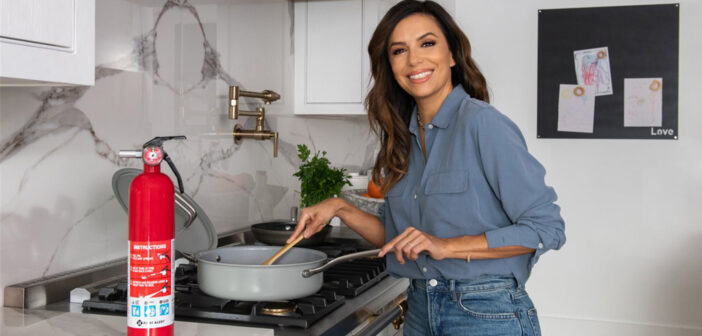You have smoke alarms in your home, you check them regularly and you practice your emergency escape plan with your family – but are you overlooking an essential component of home fire safety as you check your spring to-do list? Having fire extinguishers can give you peace of mind and help ensure your home and family are prepared in the event of a fire.
“We all lead busy lives, but it’s essential that people understand how to protect themselves from the dangers of fire,” explained actress and advocate Eva Longoria, who has teamed up with First Alert by Resideo as a brand ambassador to encourage families to install proper protection, discuss whole home safety and develop their own fire safety plans.
Once your home is equipped, it’s important to know how to use a fire extinguisher so you can act quickly should a fire start.
Home fires can occur anywhere, but according to the National Fire Protection Association (NFPA), cooking is the leading cause of home fires and fire injuries. Having fire extinguishers in the kitchen is an important first line of defense. Knowing where else to place them and how to use them can make the difference between minor damage and a potential tragedy.
First Alert and Longoria offer these tips you can keep in mind both in and out of the kitchen as you tackle your spring to-do list:
Learn your ABCs.
Fire extinguishers have specific ratings that indicate what kind of fire(s) they are designed to extinguish. Extinguishers with a Class A rating can put out fires caused by wood, paper, fabric and other common materials, while Class B rated extinguishers are intended for fires fueled by flammable liquids like cooking oils or gasoline. Class C rated extinguishers are meant for fires caused by electrical equipment, such as frayed cords. For trusted reliable protection, it’s recommended to choose a multi-purpose, or ABC rated, extinguisher, such as the First Alert Rechargeable Home Fire Extinguisher, which is ideal for common household fires and can easily be placed in the kitchen and around the home.
Equip your home.
Whether you are preparing gourmet meals or simple dishes, it is crucial to have a fire extinguishing device in the kitchen. Experts recommend placing fire extinguishers in readily accessible locations in the kitchen and garage, and on every level of the home. An easy spring DIY project is to place extinguishers where each adult member of the household can easily reach them, like under a kitchen sink or mounted to a wall, and ensure members of the household know these locations. Remember that most home fires and fire casualties result from accidents involving cooking, heating, electrical distribution and lighting equipment, and smoking, according to the NFPA.
Know how to use it.
Once your home is equipped, it’s important to know how to use a fire extinguisher so you can act quickly should a fire start.
Every First Alert fire extinguisher includes instructions on proper usage – but when you need to act quickly, a simple way to remember is with the acronym PASS:
- Pull the pin. Hold the extinguisher with the nozzle pointing away from you and release the locking mechanism.
- Aim low. Point the nozzle of the extinguisher at the base of the fire.
- Squeeze the lever slowly and evenly.
- Sweep the nozzle from side to side.
Assess the fire.
In the event of a fire, it’s important to assess the situation before grabbing your fire-extinguishing device. Fire extinguishers should only be used when a fire is contained. If the fire is small enough for you to manage, use the PASS technique to put the fire out. However, if smoke fills the room or the fire is quickly spreading, exit your home immediately and call 911.
Inspect extinguishers regularly.
When doing routine home checks this spring, make a point to also check that your fire extinguishers are in good condition. Be sure they are not blocked by anything that could impact your access, and ensure the devices are not damaged, dented or rusted. Additionally, check your extinguisher’s pressure gauge. If the pointer is in the green zone, your extinguisher is properly pressurized and ready for use. If the pointer is in the red zone, your fire extinguisher should be serviced or replaced. Remember, a fire extinguisher that has been discharged should never be stored without proper recharging by a certified professional.
To learn more about fire safety, visit FirstAlert.com.














